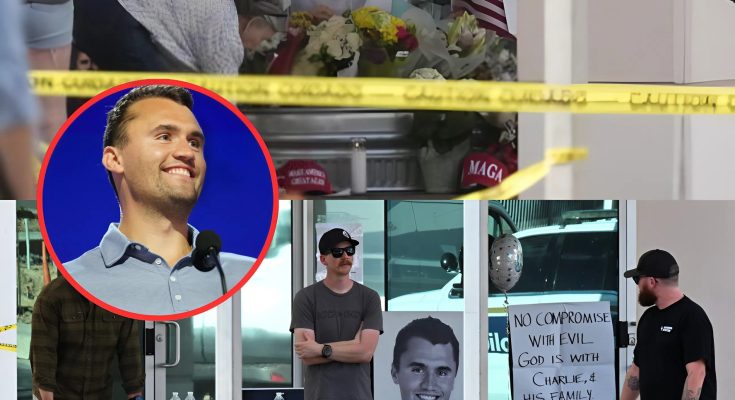
The air outside the hospital was heavy with prayer.
Thousands of students, young faces filled with both fear and hope, gathered shoulder to shoulder. They weren’t there for a celebrity concert or a political rally. They came for one man — Charlie Kirk. The leader who had once lifted them with fiery speeches, who had built an organization to empower their voices, now lay inside a sterile room, clinging to life.
The sight was surreal. Students from Turning Point USA, the nonprofit he had founded, held candles that flickered against the night sky. Some knelt, some stood in silence, and others whispered prayers, their lips trembling with the weight of desperation.

“Please let him pull through,” one young woman murmured, clutching a small Bible to her chest. Another student raised a handmade sign: We Believe in You, Charlie.
It wasn’t just a vigil. It was a plea.
Charlie Kirk was in critical condition, the result of a violent attack that had stunned the nation. News anchors repeated the words “fighting for his life,” while pundits speculated endlessly about the motive. But for these students, there was no need for analysis. Their mentor, their guide, was hurting, and they wanted him back.
Inside the hospital, doctors fought against time. Outside, thousands of young people fought with faith.
The tragedy did not stay contained within the hospital walls. Online, the story spread like wildfire. Hashtags trended, timelines filled with shock and outrage. But amidst the prayers and condolences, another energy was building — determination.
The online community was not willing to sit idly by. Forums, Twitter threads, Discord groups — all erupted into action. Amateur investigators pieced together videos, dissected timelines, highlighted inconsistencies. Some shared screenshots, others uploaded maps of the area, circling spots where security cameras might hold the truth.
It was as though an entire generation had decided, in unison, that they would not wait for officials to hand them the story. They would search for the real killer themselves.

“Justice for Charlie,” read a trending hashtag. Another post, shared millions of times, said: We pray with our hearts, but we fight with our voices.
Of course, rumors clouded the effort. Every hour brought a new theory, a new suspect, a new piece of supposed “evidence.” Yet beneath the noise, one undeniable current flowed — people cared. The attack wasn’t just on Charlie Kirk. To his supporters, it was an attack on what he represented: their movement, their beliefs, their future.
The vigil outside the hospital swelled as days passed. More students arrived, some traveling long distances. Teachers stood quietly among them, proud of their courage but heartbroken by their grief. Parents came too, holding candles next to the very children Charlie had once inspired.
A pastor stepped onto the steps and led the crowd in prayer. His voice rose over the sobbing of the young, over the rustling of signs and banners. “Lord, bring healing. And Lord, bring justice.”
His words echoed through the night.

Back inside, doctors worked tirelessly. No updates came easily, and every official statement only fueled the hunger for answers. Who would want to silence Charlie? Who could plan something so brutal? And why now, at this moment?
The questions were endless. But so was the solidarity.
For once, social media — so often a battlefield of insults and division — felt united. Whether one agreed with Charlie Kirk’s politics or not, there was a sense that violence had crossed a line that should never be crossed.
Students prayed. Strangers investigated. The world waited.
It is rare to see so many young people carrying both grief and determination at once. Yet on those nights, as candlelight spread like a sea of tiny stars, it became clear: Charlie Kirk’s fight was not his alone.
He fought inside the hospital. They fought outside it.
And until the truth was uncovered, until the real killer was found, none of them were willing to give up.
The prayers whispered in the dark were not just for survival. They were for justice, for truth, and for the hope that a leader who had given so much to them would one day rise and walk among them again.